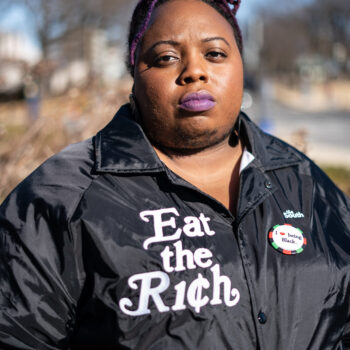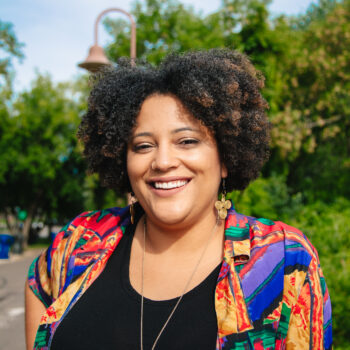Makia Green is the Organizing Director for DC Working Families Party and the co-founder of Harriet’s Wildest Dreams. They sat down with Black Visions co-director Kandace Montgomery to talk about mutual aid, the relationship between organizing and care work, and how to build a bigger “we.” The interview has been edited and condensed.
What is your vision for safety?
My vision for safety is freedom. The freedom to be able to have determination over my life, over my community. Safety looks like my grandmother being able to live in a place that is free of pests, that is free of things that are going to make her sick, having access to clean water. That my little brother doesn’t have to worry about food. That I don’t have to worry if someone is going to see him not as a child but as a threat, that I would one day lose him to the prison industrial complex. In my vision of safety, we don’t have that fear anymore.
As an organizer, your work has really centered mutual aid for Black people. Can you share how you’ve done that and why that’s been critical to the ways that you think about building power?
Mutual aid is the opportunity for us to take care of each other, to model the type of world we want to live in. When I talked about the things that I don’t want to fear, that’s through community. That’s through showing up for one another.
There are many different ways that we can show up for one another. In DC, there was the building of the DC Mutual Aid network. You had about eight different groups who organize food, groceries, medical supplies, just trying to meet the needs of the people around them and doing hyper-local organizing, which was so beautiful. You had people building up mask teams all across the city. One of the things we did was invest in a money pot where we redistribute funds, specifically to abolitionist organizers and mutual aid organizers for the city.
Doing fundraising, then just giving up to like a thousand dollars a month. Just trying to live in abundance, because we know that our folks were already struggling before the pandemic, then the pandemic exacerbated that. We also have to do mutual aid when it comes to getting our folks free. We know that people who are on the inside were being given death sentences due to the virus. [We worked] with Life After Release in PG County, Jail Support, and Incarcerated Workers Union to do participatory defense to try and help people beat their cases, to show up at court. We’ve been on court cases where we’ve organized a hundred people to show up. That’s a form of mutual aid.
I see it as strategy. How do we make sure we have the capacity on the ground to make this work happen? If we do that, we make so much more possible for our movements. How do you keep care at the center of radical transformation?
I am an organizer for our Defund MPD [Metropolitan Police Department] campaign. We’re doing a campaign to cut the police budget but also to change different legislation to decarcerate, to decriminalize. We are matching that with in-court support. We are working with people who have cases that directly relate to police misconduct. Everyone that has been organizing Defund MPD, in addition to doing advocacy and legislative transformation, the ask is that you show up for someone for court support. I think you have to do both. You have to make space for both in the campaign and you have to add it to your ladder of engagement for what it means to be a part of your campaign.
What from your own story informs the way you approach the work?
I have an uncle who’s serving a life sentence, an uncle that I never got to meet. It’s a domino effect. That type of trauma impacted my parents, how they raised me. I’ve had parents and aunts and uncles who have dealt with the “war on drugs” and the criminalization of poverty, the criminalization of drug use. The criminalization of mental health issues has been another reason why so many folks that I grew up with are either on the inside or no longer connected to family anymore.
My younger brother is a beautiful young Black boy who’s like 16 years old now. I remember this one time we had this conversation. We were waiting for the bus stop and he was showing me some karate move. He kicked the window of the bus stop, the glass. I was like, “Oh my God, Elijah, you can’t do that.” He was like, “Why can’t I?” I was like, “What if it had broken?” He’s like, “Oh, I’ll be fine. I can’t get arrested.”
I was like, “You don’t know. Your father didn’t have the talk with you yet.” I had to have that conversation with him about why people are going to look at him a certain way. Then to see it happen and to see him make mistakes and to already be involved with juvenile courts for mistakes that I made growing up, that I know people who’ve made bigger mistakes and they didn’t have those kinds of consequences.
Man, the idea that “the talk” is actually about police violence and not losing your virginity or something like that is super real for young Black people. My partner was about to go to Cup Foods the day that George Floyd was murdered. Hours from that. That fear, that anxiety that we live with every day is why we’re like, “Yeah, let’s just get rid of the police, and we don’t have to live with that.”
One of the questions that we’re asking everybody is, what’s being said but remains unheard?
I think after the uprising, a lot of folks in our movement picked up the call for defunding the police. We also saw our opposition trying to co-opt that language, trying to make claims that we can’t say defund, it doesn’t work, it doesn’t read well. There’s been such a conflict over: what do we get to call this movement for transformation? And what does it mean to be radical in how we solve the issues in our community?
With someone who doesn’t like the term “defund the police” and has not yet decided to be a prison abolitionist, the one thing we can agree on is care. The one thing we can agree on is mutual aid. My goal is to build more prison abolitionists, to build more supporters of Defund MPD, to have more conversations where people who are already in our camp can deepen their politics, but also we can make a bigger “we.” I know the way to build that bigger we is through care and through mutual aid to meet the needs of our community.
How do those conversations go? Do you have a story that you could share?
Last year, when folks were protesting every single day at BLM Plaza in front of the White House, there were a lot of people who started doing mutual aid tables. Outside, it became a safe zone for the unhoused to come and stay. People would protest. People would do yoga. People would give out free food. People would also sell food and be a street vendor.
The mayor and the police had decided that they no longer wanted the space to be safe for those folks. So they started throwing out people’s food, turning over mutual aid tables. They just were tearing up the tents of people who are unhoused and were living there. It was such a rapid response moment. Maybe a mile up in the city, there is this group of street vendors, predominantly Latinx street vendors who’ve been organizing to make sure that they have the right to be able to vend and take care of their family.
We reached out to them to say, “Hey, I know you work in a different campaign. I know you’re not exactly a part of this Defund movement, but this is happening right now. The police are taking down the vending.” Ten street vendors came from Northwest to help rebuild together. As they were helping to do this, there was this wonderful conversation about, “Oh, actually we’ve been experiencing this too. Actually, the police have been arresting our young people. We’ve been highly ticketed. We’ve had abuelitas being arrested for giving out mangoes in a food desert.”
There was just this bond. You would think that the people protesting in front of the White House and the folks giving out mangoes in their neighborhood would not be as unified. But we know, no matter what, every time you’re fighting for freedom or justice, at some point you are going to meet the state and you’re going to meet the state enforcement — and that is the police — to try and stop you from changing the status quo. That bond was one of the things that taught me that like, yeah, everyone can relate to this and doing care with each other is how we’ll unite.


